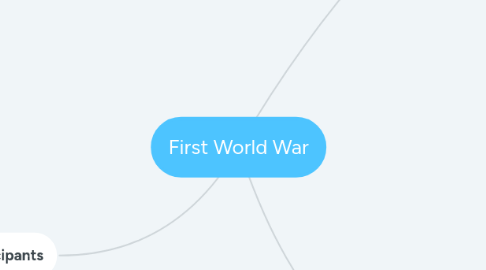First World War
by Josefina Solimo

1. Participants
1.1. The triple entente
1.1.1. At the beggining of the war
1.1.1.1. France, Russia and Great Briatain
1.1.2. After the beggining of the wa
1.1.2.1. The Allies
1.1.2.1.1. Russia, France (it's colonies), Great Britain, Romania, Belgium, Brazil, China, USA, Serbia, Great Britain (it's colonies), Russia, Japan, Portugal, Greece, Italy, Cuba, Panama, Libberia, Guatemala, Siam, Honduras, Haiti and Costs Rica
1.2. The Triple Alliance
1.2.1. At the beggining of the war
1.2.1.1. After the begginig of the war
1.2.1.1.1. Central Powers
2. Long term causes
2.1. THE RISE OF GERMANY: during the middle of the nineteenth century Germany was divided in to separeted states, Prussia was the most powerful one. In 1860 Prussia wanted to unificate Germany. But France didn't want that so they declared war on Prussia from 1870 to 1871. France was beaten and by the unification of Germany the new German Empire was created. At that time Wilhem I, king of Prussia, was declared the Kaiser of Germany, and his chief minister, Bismarck, was declared the most powerful Chancellor of GermanyAlso the economy of the German State grew between 1871 and 1914, which was based on an Industrial Revolution, and it's factories overtook Britains ones.Bismarck was a very skilful Chancellor, after 1971, he stoped the German goverment to get involved in wars, he also manteined France isolated.
2.2. THE NEW KAISER AND WORLD POWER: Kaiser Wilhem II, went to the throne in 1888, he wanted a "more agressive aproach to the rest of the world", so he made Bismarck retire in 1890, and he ended all the friendly relationships Germany had with Russia. Also a lot of countries started to see Germany as a threat.
2.3. THE ARMS RACE: In 1897 Germany started the construction of a navy that could chalange the might of the British one.Then in 1900 the German goverment ordered the construction of a new fleet of 41 batlesheeps. The British answered to this threat by encreasing the size of their navy and introducing a new type of battleship, the Dreadnought, in 1906. The Germans responded by building similar ships of their owns, and Britain went on to order more powerful battleships, called Super DreadnoughtsOther countries participated on this, like French, they increased their forces, and in 1914, they had 4 million of soldiers, the Russian spent a lot of mony on military railways.
2.4. THE TWO ALLIANCES: Germany had an alliance with Austria-Hungary, in 1879. At first there only enemy was France, but as a result of the clumsy policy of Germany Russia joined forces with France. They agreed that if their country was atacked by Germany the other one will declare war on Germany, in 1892.The Britain goverment started to look for allies, first they thought it was a good idea to be Germany's allie, but after seeing that the german policy was so bad managed, they decided to be Russia and France allies. However it wasn't a real allie, it was an enetente, they only agreed to protect each other.
3. Short term causes
3.1. KILLING IN SARAJEVO: during 1914 Bosnia was part of Austria-Hungary empire, a lot of Serbs living there, wanted to be as free as Serbia, a neighbour country. So the 28 June of 1914 a serb called Gavrilo Princip, a integrat of a group of terrorists called Black Hand, killed Archduke Frand Ferdinanad, and his wife, after a wrong attempt.This created a disput between Serbia and Austria-Hungary. Also Austria-Hungary was looking for an escuse for atacking Serbia, so they were ready to atack.
3.2. GERMAN DESICION FOR WAR: on 1913 there was a quarrel between Austria-Hungary and Serbia and Russia, about how they would divide land, tooked from Turkey. This almost led to a war, but as Germany didn't want to support Austria-Hungary, the war didn't happened.On 1914 the policy of Germany changed. The goverment gave Austria his fully backing for an atack to Serbia. Germany knew that there was a chance tha Russia would go to war and help Serbia, and that could create a general war.The following weeks, Germany gave more than support to Austria-Hungary. Germany convinced Austria-Hungary that the war have started, and that it should ignore any nogociations with England and Russia.
3.3. CONFUSSION ABOUT BRITISH POSITION: If the German goverment would know the position of England in the war they would thing two times about starting it. The position of Britain was not clear, it had telationships with Russia and France, althought it wasn't exacly an alliance, so Britan didn't has to fight with any country.The senior civils servants, said that Britain would definetly go on war with France and Britain, so as to stop Germany, but sir Edward Grey, wanted to avoid war by negociating. However the 3 of August, when Germany attacked France via Belgium, England stoped talking and negociating and went to war.


